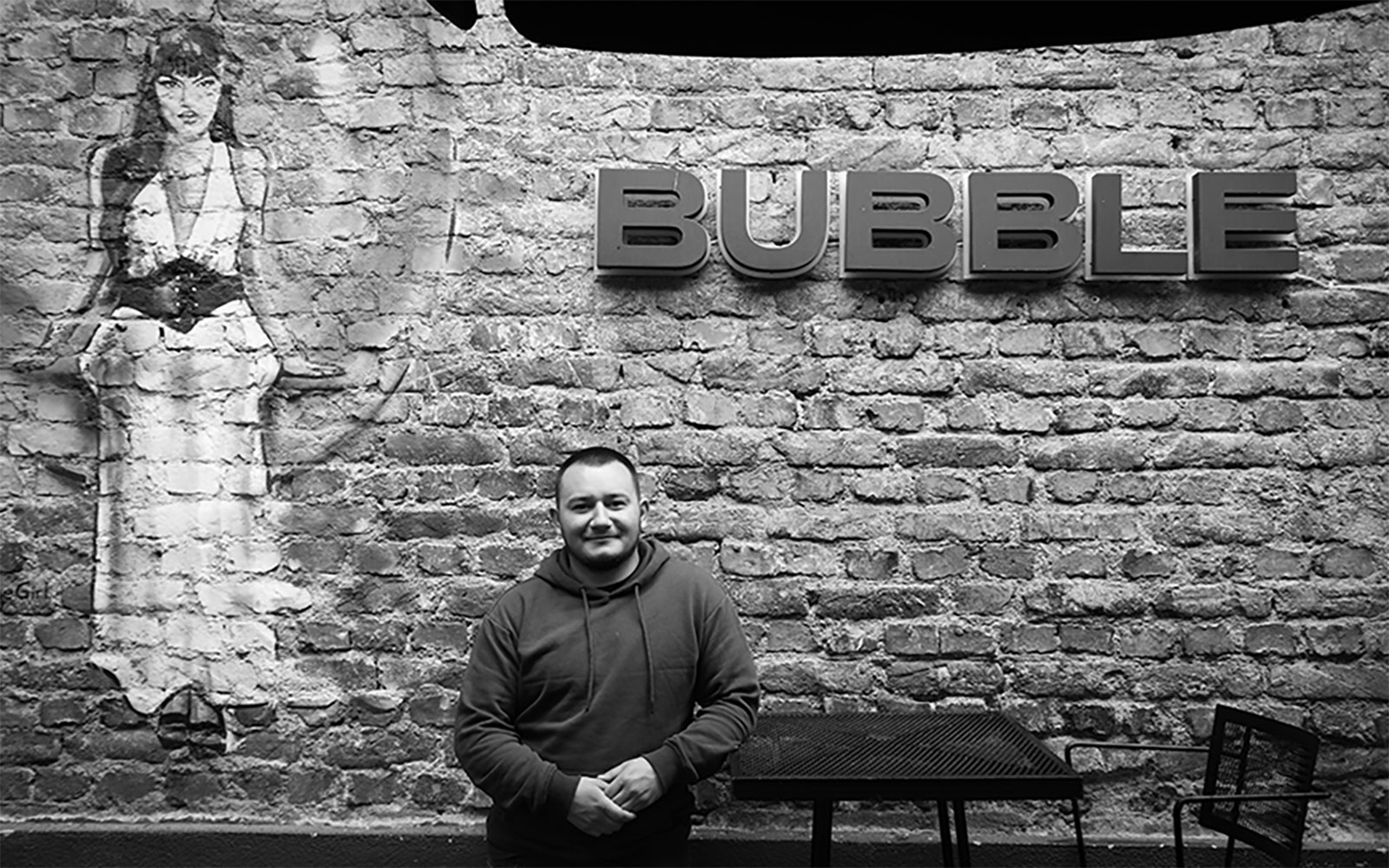
Tucked away in a side street just off the bustling Mother Theresa Boulevard, the main pedestrian thoroughfare in Pristina, Bubble Pub is indistinguishable from all the other cafes and bars around Kosovo’s capital, at least at first sight. But Bubble is not like other bars: as the first-ever LGBTQI+ bar in Kosovo, it provides a much-needed safe space for the queer community to gather and express itself.
“The project was years in the making. I started toying with the idea of building a space for the community five years ago, but I knew it was going to be expensive,” recalls Lend Mustafa, transgender activist and founder of Bubble. “Then someone suggested I apply for EED funding. Finally, we were able to open Bubble last year.”
Still in his mid-twenties, Lend already has a decade of experience as an activist, having started volunteering in LGBTQI+ organisations as a teenager. He came out publicly as a transgender man at nineteen through a documentary.
“Participants were supposed to hide their faces, but I didn’t want to. I wanted my face to be seen and my voice to be heard.” The documentary got more than 70,000 views and Lend became one of the faces of queer activism in Kosovo.
“At the beginning we were trying to convey very basic messages, like ‘Love is love’. It was the first time the movement was having a more public profile, and we were trying not only to get society to accept us, but to get members of the community to accept themselves and other members,” he explains, recalling how some queer people struggled to understand the concept of being transgender.
He soon decided to build a physical space for the LGBTQI+ community to meet, socialise and organise, but the idea of opening a pub was outside the scope of many traditional donors. Eventually, EED funding allowed Bubble to open in April 2022.
Lend has decorated the space with black walls and colourful lights. A graffiti outside depicts a young woman sitting on a rainbow bubble - a moving tribute to a member of the local community, a transgender woman who committed suicide.
Lend has now put together a weekly schedule of drag shows, live music, poetry readings, and other events that allow the bar to turn a profit while also giving a space for community members to express themselves and be financially compensated for their performances.
The situation for LGBTQI+ people in Kosovo is difficult across the board, with an attempt by Prime Minister Albin Kurti to introduce same-sex civil unions thwarted by the Parliament in March last year. Trans people face additional challenges as no clinics perform gender reassignment surgery in Kosovo. “People usually have to travel to North Macedonia for the procedure,” says Lendi. Hormone therapy is also rarely offered in Kosovo.
Changing first names in ID documents to match one’s gender identity is also complicated. In 2020, transgender activist Blert Morina won a landmark case in the Constitutional Court, with judges approving his documents change. However, this right has not been enshrined in a law, so each individual wishing to change their name and sex on their documents has to go through a lawsuit – something not many can afford or want to go through.
Bubble tries to help the transgender members of the community through fundraising events, which so far have covered transition costs for six people. They are also in the process of creating an NGO, the Bubble Foundation, to provide further assistance to the community.
Lend admits that it can be challenging to balance the need to turn a profit to keep Bubble up and running with listening to the needs of the community: “You have to have the brain of a businessman, while your heart is still that of an activist.”
One year after its opening, Bubble is now a profitable business; most importantly, it has become the place to be for LGBTQI+ individuals in Pristina. “Our biggest success is the togetherness we have created. It cannot be unseen. When people come here they just feel at home,” says Lend.
He is also optimistic about the future of the queer community. “If we compare Kosovo with different countries, of course, we’re very behind in terms of LGBTQI+ rights. But if we look back to how the situation was even just ten years ago, it’s much better. The last time there was a major attack against the community was in 2012. Compared to then, Pristina has basically become San Francisco,” he says laughing.
* This designation is without prejudice to positions on status, and is in line with UNSC 1244 and the ICJ Opinion on the Kosovo Declaration of Independence.
This article reflects the views of the grantees featured and does not necessarily represent the official opinion of the EED.
Picture credits: Samir Karahoda